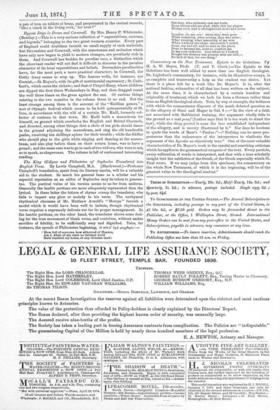The King ffdipus and Philoctetes of Sophocles Translated into English
Verse. By Lewis Campbell, M.A. (Blackwood.)—Professor Campbell's translation, apart from its literary merits, will be a valuable aid to the student. So much his general fame as a scholar and his 'especial reputation as an editor of Sophocles may be taken to guaran- tee. The poetical value of his version seems to us far from uniform. -Generally the iambic portions are more adequately represented than the lyrical. In these latter the fetters of rhyme cramp the translator, who fails to impart any glow or melody to his verse. The unrhymed rhythmical choruses of Mr. Matthew Arnold's " Morope " furnish a model which it would have been well to imitate, though rhythmical verse requires a supremely delicate ear for its proper management. In the iambic portions, on the other hand, the translator shows some feel- ing for the true movement of blank verse, and contrives, without undue sacrifice of fidelity, to be sufficiently easy and dignified. Take, for instance, the speech of Philoctetes beginning, 0 sri,A.X. pszOspOs :—
"Hew full of sorrows, how abhorred of Heaven, Am I, when of my state no faintest word Math reached my home, or any Grecian land! But they, who pitilessly cast me forth. Keep silence and are gad, while this my plague Blooms ever, and is strengthened more and more.
Imagine, oh, my son when they were gone What wakening, what arising, then was mine; What weeping, what lamenting of my woe, When I beheld the ships, wherewith I sailed, Gone, one and all, and no man in the place, None to bestead me, none to comfort me In my sore sickness. And where'er I looked, Nought but distress was present with me still,— No lack of that, for one thing."


































 Previous page
Previous page